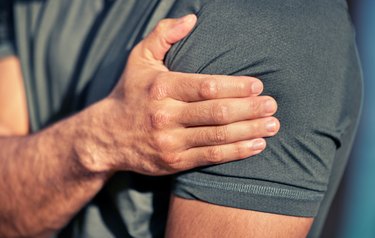
Nothing gets in the way of lifting weights quite like a sore, swollen deltoid. But you can still get in a great strength workout after a flu shot.
In fact, working out after your shot can help you fight the flu. In a May 2022 study in Brain, Behavior, and Immunity, researchers found exercising for 90 minutes following your shot can actually up your body's antibody response, improving the vaccine's effectiveness.
Video of the Day
Video of the Day
Plus, working out after a flu shot may also reduce symptoms like soreness at the injection site, according to a January 2020 Brain, Behavior, and Immunity - Health study. Exercising after a flu shot gets your blood flowing and can act as an anti-inflammatory for your body. And a June 2022 review in PLOS One, which combed through past studies on exercise and vaccines, found including the same arm where you received the shot in your workout may boost your antibody response even more.
There are generally no restrictions on post-vaccine exercise, and it's fine to do strength workouts after a flu shot as long as you feel up to them and listen to your body. But following these strategies can make lifting weights after a flu shot, and flu shot side effects, far more comfortable:
4 Tips for Doing a Strength Workout After a Flu Shot
1. Get the Shot in Your Non-Dominant Arm
As soon as you sit down in the pharmacist or doctor's chair, ask to get the vaccine in your non-dominant arm. This will make it easier to continue your normal daily activities, like working out, even if you experience some mild soreness in that shoulder.
2. Listen to Your Body
Though recent research suggests same-arm exercise gives you the most benefit, if your arm's not totally comfortable after your shot (it's feeling very sore or you have trouble accessing your shoulder's full range of motion), stick to lower-body exercises until your arm feels better. Trying to do moves like overhead presses and bench presses when you're lacking shoulder mobility can increase your risk of injury.
3. Warm Up With Some Shoulder Mobility
Speaking of shoulder mobility, do some dynamic stretching and warm up well before doing any lifting — even if you don't plan on taxing your deltoids. Even a move like a back squat requires your arms and shoulders to move around freely.
Also use your warm-up routine to check in with how you're doing. If you feel good, you might try moving forward with your regular routine.
Related Reading
4. Stick to Moderate Intensities
Today's probably not the day to shoot for a PR. And that's OK. Respect that there's a lot going on in your body right now — even if you don't have any intense side effects. Let your immune system focus on responding to the vaccine rather than overwhelming it with super-hard exercise.
On a scale of 1 to 10, try to keep your rate of perceived exertion under an 8 — or keep things even lighter if you need to.
Warning
If you experience pain, stop lifting. Consider another activity, such as stationary cycling, if you are not experiencing other symptoms.
When Not to Work Out After a Flu Shot
After you receive your flu shot, it's normal to have some side effects such as redness, soreness and swelling at the injection site, according to the Centers for Disease Control and Prevention. This soreness is often the result of the immune system creating protective antibodies in response to the vaccine, which is what allows your body to fight the flu.
In some cases, people experience mild, flu-like symptoms such as muscle pain, fever or weakness. These should not last for more than a few days after the vaccination, per the CDC
If you experience any of these flu-like symptoms, consider it a rest day. Also, if you have any nausea or dizziness, it is not safe to lift weights or do any exercise. If the symptoms are severe or worsen, consult your doctor.
Warning
In rare cases, individuals can have an allergic reaction to the flu vaccine, according to the CDC. Symptoms include difficulty breathing, hives, weakness, rapid heartbeat and dizziness. If you experience these symptoms, contact your doctor immediately as the reaction can be life-threatening.
- Centers for Disease Control and Prevention: Seasonal Flu Shot
- Brain, Behavior, and Immunity: "The effects of exercise on vaccination responses: a review of chronic and acute exercise interventions in humans"
- Brain, Behavior, and Immunity: "Exercise after influenza or COVID-19 vaccination increases serum antibody without an increase in side effects"
- PLOS One: "Physical activity and acute exercise benefit influenza vaccination response: A systematic review with individual participant data meta-analysis"
- University of Rochester Medical Center: Give it Your Best Shot When Getting a Flu Shot
Was this article helpful?
150 Characters Max
0/150
Thank you for sharing!
Thank you for your feedback!